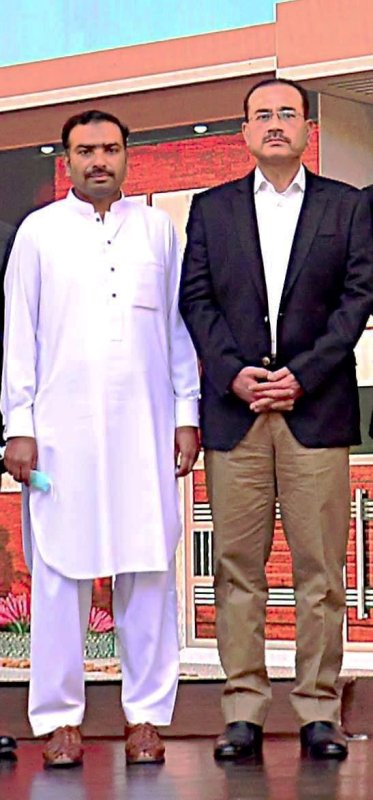Is General Asim Munir, the current Chief of Army Staff of Pakistan, a figure of calculated power or a harbinger of a new, and potentially volatile, era for the nation? The ascent of General Munir to the apex of Pakistan's military establishment signifies a pivotal shift, marking a departure from traditional leadership and introducing elements that have both intrigued and unsettled observers both within and beyond the country’s borders.
Syed Asim Munir Ahmed Shah, born in Rawalpindi, carries with him a lineage that speaks to the intricate tapestry of Pakistani identity. His father, Syed Sarwar Munir, a schoolteacher and a respected figure in the community as an imam, instilled in him a deep connection to both education and religious principles. This early exposure to faith, coupled with his studies at the Markazi Madrasa Dar-ul-Tajweed in Rawalpindi, shaped his formative years, culminating in his becoming a Hafiz-i-Quran. This title, denoting someone who has memorized the entire Quran, is a significant marker of piety and religious devotion, and it undoubtedly plays a role in how he is perceived, particularly within the context of Pakistan's social and political landscape.
| Category | Details |
|---|---|
| Full Name | Syed Asim Munir Ahmed Shah |
| Date of Birth (Estimated) | Late 1950s |
| Place of Birth | Rawalpindi, Pakistan |
| Father | Syed Sarwar Munir (Schoolteacher and Imam) |
| Education | Markazi Madrasa Dar-ul-Tajweed, Rawalpindi; Officer Training School, Mangla |
| Military Career Highlights |
|
| Awards & Honors |
|
| Religious Affiliation | Islam (Hafiz-i-Quran) |
| Controversies |
|
| Additional Information | Son of a 'muhajir' family (migrants from Jalandhar after Partition) |
| Reference | Wikipedia - Asim Munir |
General Munir's path to power is marked by a distinct blend of military acumen and religious conviction. His early career, beginning with his training at the Officers Training School in Mangla in 1986, saw him quickly distinguish himself, earning the prestigious Sword of Honour. This early recognition, coupled with his commissioning into the 23rd Frontier Force Regiment, set the stage for a rapid rise through the ranks. He has served in various commands and intelligence agencies, a crucial experience base that undoubtedly shaped his strategic thinking and understanding of Pakistan's complex security challenges.
The narrative surrounding General Munir often emphasizes his religious background. The fact that he is a Hafiz-i-Quran, the son of an imam, has fueled discussions about the intersection of faith and power in Pakistan. While some see this as a source of strength and moral compass, others express concern about the potential for religious zeal to influence military decisions, blurring the lines between secular governance and religious ideology. This is particularly pertinent in a country where the military has historically wielded considerable influence over political affairs.
The perception of General Munir as an outsider is another defining aspect of his profile. Unlike some of his predecessors, he doesn't come from a traditional military lineage, bringing a fresh perspective to the high command. This has led to speculation about his leadership style and his approach to internal reforms within the army. The fact that he is considered a religious zealot by some adds another layer of complexity to the understanding of his leadership style.
Recent events have cast a shadow over General Munir’s leadership. His remarks on the Kashmir issue have sparked tensions with India. Such statements, particularly in a region as volatile as Kashmir, require careful consideration of their geopolitical ramifications, and any misstep could have serious consequences. The timing of his statements, preceding the tragic events in Pahalgam, has raised difficult questions about the potential impact of his rhetoric on the security situation in the region.
The reported existence of a letter from junior officers, expressing concern over what they perceive as political oppression and a personal vendetta within the military, is a highly unusual development. If true, these accusations, which include charges of turning the military into a tool of political oppression, pose a grave challenge to General Munir's authority and the overall stability of the army. The call for his resignation underscores the depth of the crisis and signals a potential fracturing within the ranks.
The convergence of these factors – his religious background, his perceived outsider status, the recent controversies surrounding his statements and actions, and the internal dissent – paints a complex picture of General Munir’s leadership. It is a picture characterized by both opportunity and risk, where the lines between religious conviction, political ambition, and military strategy are becoming increasingly blurred. The trajectory of his tenure will undoubtedly shape the future of Pakistan and its role in the region.
The implications of General Munir's actions extend beyond Pakistan's borders. His stance on Kashmir, a long-standing flashpoint between Pakistan and India, has direct ramifications for regional security. Any escalation of tensions in the region could have far-reaching consequences, requiring careful diplomatic navigation and a commitment to de-escalation from all parties involved.
As General Munir navigates the challenges ahead, he faces a critical test of his leadership. He must balance the demands of his position, manage internal dissent, and address the complex security challenges facing Pakistan. His legacy will be determined by his ability to steer the country through this turbulent period and to uphold the principles of stability, security, and respect for the rule of law.
The evolution of General Munir's career, from a promising young officer to the Chief of Army Staff, offers a fascinating lens through which to view the dynamics of power in Pakistan. His actions, decisions, and the controversies that surround him will continue to be scrutinized both domestically and internationally. The coming years will undoubtedly reveal the full extent of his influence and its impact on the future of Pakistan.



